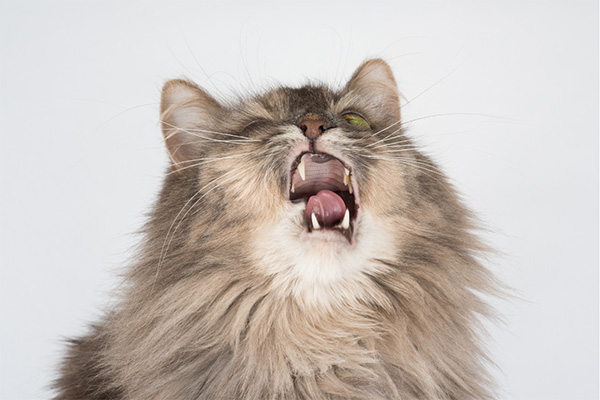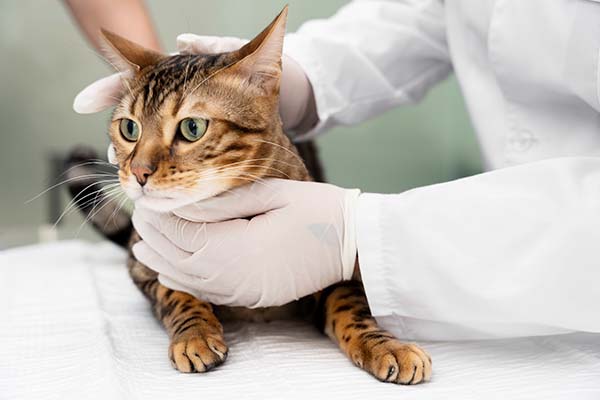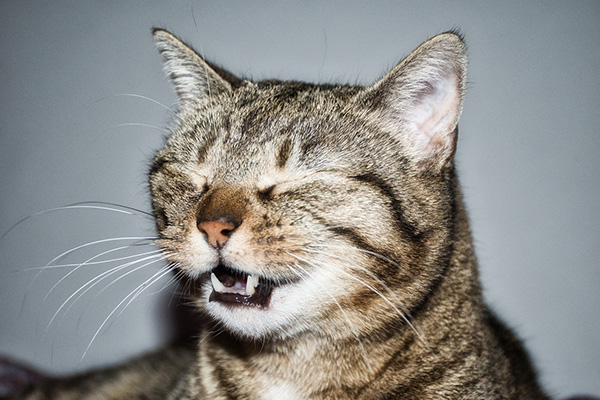Cats, much like their human counterparts, can experience the occasional sneeze, a phenomenon that often leaves pet owners curious and sometimes concerned. While sneezing in cats can be as benign as a simple tickle in their nose, it can also be indicative of underlying health issues.
In this comprehensive guide to cat sneezing, we dive into the various causes and how to treat cat sneezing. Understanding why your feline friend sneezes is crucial in ensuring their well-being and can provide valuable insights into their overall health.
What Is Cat Sneezing
Cat sneezing itself is a natural reflex action, much like in humans, that helps cats clear their nasal passages of irritants or blockages. This expulsion of air through the cat's nose can be triggered by various factors, ranging from benign causes like dust, pollen, or strong scents to more concerning ones such as upper respiratory infections, allergies, or dental problems.
While occasional sneezing is typically normal, frequent or chronic sneezing may indicate underlying health issues that warrant veterinary attention. Understanding the context and frequency of your cat's sneezing is key to determining whether it's a simple, harmless occurrence or a symptom needing medical evaluation.
Symptoms
If your cat is sneezing, it's important to be vigilant for additional symptoms that could indicate more serious health issues. Here's an expanded look at these symptoms:
Nasal Discharge
Eye Discharge
Coughing or Wheezing
Fever
Lethargy
Loss of Appetite
Sneezing Blood
Difficulty Breathing
Unpleasant Odor
Behavioral Changes
If these symptoms, especially in combination, are observed alongside sneezing, they should not be ignored. Timely veterinary intervention can play a crucial role in your cat's diagnosis, treatment, and overall recovery. Regular health checkups and observing any changes in your cat's behavior or physical condition are key to ensuring their long-term health and well-being.

Cause Of Cat Sneezes
There are various causes of why cats sneeze. It's important to recognize that while some triggers are minor and easily manageable, others may indicate more serious health issues. Here's a detailed look:
Environmental Irritants: Cats have sensitive noses, so common household items like scented candles, air fresheners, cigarette smoke, dust, or strong cleaning products can irritate their nasal passages, leading to sneezing. Consider using unscented products and maintaining a clean, dust-free environment.
Foreign Bodies: Small particles such as pollen, dust, or even tiny objects can become lodged in a cat's nasal passages, causing irritation and sneezing. In some cases, veterinary intervention may be required to remove these objects.
Allergies: Cats, like humans, can develop allergies to a variety of substances. This can include environmental allergens (pollen, mold, dust), food allergies, or even allergies to flea bites. The essential aspect of treatment lies in identifying and eliminating the allergen.
Upper Respiratory Infection: Viral infections, like the common feline herpesvirus and feline calicivirus, are major causes of sneezing. Bacterial infections can also contribute. These infections are particularly common in shelters or multi-cat households and can be accompanied by symptoms like discharge from the eyes or nose, coughing, and lethargy.
Dental Disease: In some cases, dental issues can contribute to sneezing in cats. Infections in the teeth or gums can spread to the nasal passages. Good dental hygiene and regular checkups can prevent these issues.
Fungal Infections: While less common than viral or bacterial infections, certain fungi can infect a cat's respiratory system, leading to sneezing and other symptoms. These infections often require specialized treatment.
Nasal Tumors: Nasal tumors can cause chronic sneezing and are more common in older cats. Other symptoms might include nasal discharge or nosebleeds.
Stress: Cats under stress can exhibit various physical symptoms, including sneezing. Maintaining a stable environment and routine can help reduce stress levels in cats.
Vaccinations: Some cats may react to certain vaccinations with mild sneezing. Typically, this is a short-lived occurrence and not a cause for concern.
Viral Shedding: In some cases, cats that have recovered from a viral upper respiratory infection may experience bouts of sneezing when the cat's immune system is stressed, known as viral shedding.
In all cases, if sneezing is persistent, accompanied by other symptoms, or there's any cause for concern, a visit to the veterinarian is warranted. Regular health checkups can help catch and address many of these issues early on, ensuring the well-being of your feline friend.
How To Diagnose Sneezing Cats
Diagnosing the cause of sneezing in cats involves a systematic approach to understanding the underlying issue. Veterinarians typically follow these steps:
Medical History and Observation
Physical Examination: A complete physical examination focuses on the respiratory system. The vet checks for signs of respiratory distress, nasal discharge, and any abnormalities in the mouth, teeth, and throat.
Dental Examination
Nasal Swab or Culture: To identify infections, a nasal swab or culture may be taken to test for the presence of bacteria, viruses, or fungi.
Blood Tests: These can help rule out systemic conditions or infections that might cause sneezing.
Allergy Testing
Imaging: X-rays or CT scans can be crucial in diagnosing issues like nasal obstructions, tumors, or structural abnormalities
Endoscopy: In some cases, an endoscopic examination of the nasal passages and airways may be necessary to look for polyps, tumors, or foreign bodies.
Biopsy
Based on these diagnostics, the veterinarian can determine the cause of the sneezing and recommend an appropriate course of treatment. Pet owners need to provide as much information as possible and follow through with recommended diagnostic tests for a precise diagnosis and effective treatment plan.

Image by Freepik
Treatment
The treatment for a cat's sneezing depends on the underlying cause. Here are general treatment approaches based on different diagnoses:
Environmental Irritants
Reducing exposure to potential irritants is the first line of defense. This involves maintaining a clean, dust-free environment, avoiding smoking or using strong fragrances around the cat, and choosing unscented cleaning products. Regularly changing air filters and utilizing air purifiers can also alleviate the issue.
Allergies
Crucial to addressing the issue is identifying and subsequently avoiding allergens. This might involve changes in the cat's diet, using hypoallergenic bedding, and implementing strict flea control measures. The veterinarian may prescribe antihistamines, corticosteroids, or other allergy medications based on the severity of the condition.
Upper Respiratory Infections
For viral infections, supportive care is essential, as antibiotics are ineffective. This includes ensuring the cat eats, stays hydrated, and rests in a comfortable, stress-free environment. Humidifiers can help ease breathing. For bacterial infection, antibiotics will be prescribed. In some cases, nebulization therapy or supplemental oxygen may be necessary.
Dental Issues
Professional dental cleaning, tooth extractions, or treatment for gum disease might be required. Implementing regular dental care at home and scheduling periodic checkups can help prevent future dental problems in your cat.
Fungal Infections
These are treated with specific antifungal medications, and the treatment can be quite prolonged. Follow-up visits are crucial to monitor the cat's response to the treatment.
Foreign Bodies
Removal of foreign objects from the nasal passage is typically a straightforward procedure but requires veterinary expertise. Post-removal care will depend on the nature of the foreign body and the cat's condition.
Nasal Tumors
The approach to treating nasal tumors varies depending on the tumor's type, size, and location. Options can include surgery, chemotherapy, radiation therapy, or a combination of these. Additionally, the veterinarian may emphasize palliative care to address symptoms and enhance the overall quality of life for the cat.
Stress
Reducing stress can involve environmental modifications, such as providing safe hiding places, perches, and interactive toys. Pheromone diffusers and calming supplements can prove effective, while in severe cases, anti-anxiety medications may be prescribed under veterinary guidance.
Maintaining consistency in treatment and closely monitoring the cat's response are essential aspects of the overall care. Regular veterinary check ups will help ensure that the treatment is effective and allow for adjustments as needed. Additionally, observing the cat for any changes in behavior or health and communicating these to the vet can greatly aid in managing the condition effectively.

FAQs
Is it normal for my cat to sneeze?
Occasional sneezing in cats is usually normal, especially if they encounter everyday irritants like dust or a strong smell. However, if the sneezing is frequent, repetitive, or seems to be distressing your cat, it might be indicative of a more serious issue, such as a respiratory infection or an allergy, and should be checked by a vet.
Can cats catch a cold?
Cats can experience upper respiratory infections, often termed as "cat colds." These conditions are often caused by viruses such as feline herpesvirus and feline calicivirus, and they can be highly contagious among cats. Symptoms can include sneezing, nasal congestion, eye or nose discharge, and sometimes fever or lethargy.
How can I tell if my cat's sneezing is serious?
Sneezing that's frequent, accompanied by a nasal discharge (especially if it's colored or bloody), lethargy, reduced appetite, or other symptoms like coughing, could indicate a serious condition. Persistent or severe sneezing, especially if it's out of character for your cat, warrants a vet checkup.
Could my cat be allergic to something in my home?
Cats, like humans, can have allergies. Common household allergens for cats include some types of litter, certain foods, dust, mold, pollen, and even fleas. Identifying and eliminating the allergen is crucial; in some cases, allergy testing at the veterinary clinic may be necessary.
Can my other pets catch whatever is making my cat sneeze?
If the cause of the sneezing is an infectious agent like a virus, it could be contagious to other cats. However, they are generally species-specific and won't spread to dogs or humans. However, it is always prudent to consult a veterinarian to understand the risks and necessary precautions.
Is sneezing a sign of stress in cats?
Directly, sneezing is not a recognized sign of stress in cats. Nevertheless, stress can compromise a cat's immune system, rendering them more vulnerable to infections that may result in sneezing. Managing stress through environmental enrichment and stable routines can be beneficial.
